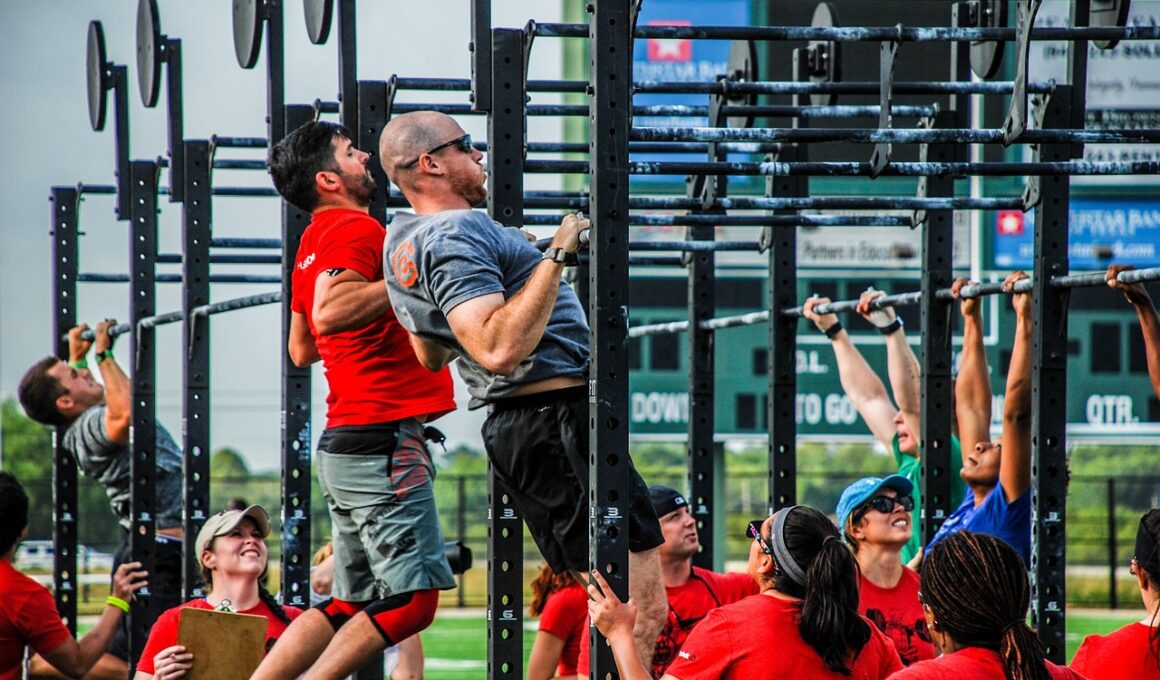Nutrition Habits That Complement Your CrossFit Training
Nutrition plays an essential role in the effectiveness of your CrossFit training and overall health. Adopting the right nutrition habits will enhance your performance, aid recovery, and promote long-term wellness. Start by prioritizing whole, nutrient-dense foods such as fruits, vegetables, lean proteins, and healthy fats. These foods provide the necessary vitamins and minerals crucial for your body’s recovery post-workout. Additionally, it’s vital to hydrate adequately, as hydration impacts performance and recovery. Drinking plenty of water throughout the day and especially before and after training sessions can help maintain optimal performance levels. Consult a dietitian or nutritionist who specializes in sports nutrition for personalized guidelines that fit your goals. Meal prep can significantly help in maintaining healthy eating habits, reducing the temptation to consume processed foods. Planning your meals ensures that you’re fueling your body appropriately before and after workouts. Incorporating complex carbohydrates like quinoa, brown rice, and sweet potatoes will also provide energy during intense training. Overall, a balanced approach helps ensure effectiveness and longevity in your fitness journey.
Balancing Macronutrients for CrossFit
To enhance your CrossFit training, understanding and balancing macronutrients—proteins, fats, and carbohydrates—is vital. Protein is especially important for muscle recovery and growth, so aim for a daily intake in the range of 1.2 to 2.0 grams per kilogram of body weight. Include high-quality protein sources such as chicken, fish, beans, and plant-based proteins for optimal benefits. Carbohydrates, on the other hand, provide the fuel necessary for high-intensity workouts. Complex carbohydrates like oats, fruits, and whole grains should be the foundation of your carb intake to sustain energy levels during training. Healthy fats are equally important and should not be overlooked. Sources such as avocados, nuts, and olive oil can help in reducing inflammation and promoting hormonal balance. A general rule of thumb is to fill your plate with 40% carbohydrates, 30% protein, and 30% fats. Keep in mind that each individual’s macronutrient needs may differ based on training intensity and personal goals. Adjust these ratios according to how your body responds during workouts and overall well-being.
Meal timing can greatly influence your performance and recovery. Consuming balanced meals before and after workouts can optimize results and speed recovery. Aim to eat a nutritious meal containing carbs and protein about two to three hours prior to exercising. This helps ensure that your body has enough fuel for peak performance. Post-workout, it’s crucial to replenish nutrients, ideally within an hour of finishing your session. A combination of protein and carbohydrates in your recovery meal significantly aids muscle repair and replenishes glycogen stores. For convenience, consider protein shakes or bars as a quick post-workout option, but always ensure they are made with high-quality ingredients. Additionally, healthy snacks throughout the day can maintain steady energy levels and prevent fatigue. Items like Greek yogurt, mixed nuts, or fruit can provide a good balance of nutrients. Also, avoid large meals right before intensive workouts, as this can lead to discomfort and hinder performance. Monitoring how your body reacts to different meal timings can provide insights on what works best for you, allowing for optimal training outcomes.
Incorporating supplements into your nutrition plan can sometimes enhance your CrossFit training results. While whole foods should form the foundation of your diet, certain supplements can help fill in gaps and support performance. Protein powders can be a convenient option for meeting daily protein requirements, especially post-workout. Creatine is another popular supplement that has been shown to improve strength and power during high-intensity exercises, making it a common choice among athletes. Branched-chain amino acids (BCAAs) can also aid in muscle recovery, reducing soreness and fatigue. Additionally, omega-3 fatty acids found in fish oil can work wonders for decreasing inflammation and may improve recovery times. However, it’s crucial to approach supplements thoughtfully and consult a healthcare professional or nutritionist before introducing new ones into your regimen. Keep an eye out for quality brands that provide transparency in their ingredients and potency. Balancing supplementation with a well-rounded diet ensures that you maximize your CrossFit training results without unnecessary health risks.
Maintaining a balanced diet while navigating a busy lifestyle may seem challenging. However, establishing healthy nutrition habits is essential for your CrossFit journey. Meal prepping in advance is one strategy that can make maintaining these habits much easier. By dedicating time to prepare meals for the week, you eliminate decisions associated with what to eat when hunger strikes. This eliminates the temptation to reach for less healthy options like takeout or processed snacks. Focus on batch cooking proteins, grains, and veggies that can be combined in various meals throughout the week. Consider using tools like slow cookers or instant pots, which can significantly reduce the cooking time required. Additionally, keep healthy snacks readily available; items like nuts, yogurt, and fruits make great portable options that prevent energy dips. Staying organized also means keeping your pantry stocked with the essential staples you enjoy. Remember, consistency is key in maintaining momentum. When you fuel your body with the right choices regularly, you will foster better relationships with food, your training, and your health overall.
Rest and recovery are equally critical to any nutrition strategy. Remember that intense CrossFit training causes stress on your body, which needs adequate time to recharge. Without sufficient recovery, your body may not respond optimally to the training, leading to fatigue and possibly injury. Integrating rest days into your training routine is essential for recovery and should not be overlooked. Use these days to focus on light activities like walking or gentle yoga to maintain mobility and promote circulation. Proper sleep is also vital for recovery, as it allows your muscles to repair while supporting overall health and cognitive function. Aim for seven to nine hours of quality sleep every night, and consider establishing a calming nighttime routine to improve sleep quality. Proper hydration also plays a role in recovery as it flushes out toxins and reduces muscle soreness. Regularly assess how your body feels, and listen to its signals. Adopting a holistic approach to nutrition, training, rest, and recovery will optimize your CrossFit journey and ensure longevity in your fitness regimen.
Finally, it is essential to evaluate and adjust your nutrition habits routinely. As you progress in your CrossFit training, your nutritional needs may also change. Therefore, keep a food journal to note patterns in your eating habits and how they correlate with your performance and overall health. This can help you identify areas that need improvement, such as increased protein intake or discovering any foods that may lead to discomfort during workouts. Regularly consulting with a nutritionist can ensure that your diet is aligned with your personal fitness goals. They can provide insights into the latest research and practical strategies to help you fine-tune your nutrition. Building a support network with fellow CrossFitters can also make a difference. Sharing recipes, meal ideas, and personal experiences can provide motivation and a broader perspective on nutrition. Remember, embracing a nutrition habit is a gradual process and should be tailored to your individual preferences and lifestyle. By making informed food choices and being adaptable, you will foster a positive relationship with food while achieving your CrossFit goals.
Additionally, it’s crucial to adopt a mindset that prioritizes long-term health over quick fixes. Sustainable nutrition habits will yield better results in the long run compared to fad diets that are hard to maintain. Opt for gradual changes that are realistic and achievable within your lifestyle, which will likely lead to lasting outcomes. Focus on making small substitutions and modifications in your current diet, rather than completely overhauling it. Celebrate your progress and successes, no matter how small, to keep your motivation high. By embracing a patient approach, you’ll learn to enjoy the process of nurturing your body through the nutritional choices you make. As you gain more knowledge about nutrition, experiment with different foods, and find what truly works for you. Remember to keep your meals enjoyable and varied, as boredom can lead to reverting to old habits. Ultimately, the goal is to create a flexible and balanced nutrition strategy that complements your CrossFit training, enhances your performance, and nurtures your overall health.


